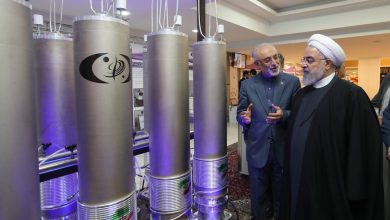Syrian jets pound Eastern Ghouta for fifth day as UN pleads for ceasefire

A civil defence volunteer helps an injured child after bombing in Eastern Ghouta on Wednesday (Reuters)
The Syrian air force continued to pound the last rebel enclave near Damascus for a fifth straight day on Thursday, as the United Nations pleaded for a halt to one of the fiercest air assaults of the seven-year civil war.
More than 300 people have been killed in the rural eastern Ghouta district on the outskirts of Damascus since Sunday night, and many hundreds have been wounded, according to human rights monitors and aid agencies who say Russian and Syrian planes have struck hospitals and other civilian targets.
Residents of Douma, the biggest town in the district, described plumes of black smoke billowing from residential areas after planes dropped bombs from high altitude. Searches were underway for bodies amid the rubble in the town of Saqba and elsewhere, said rescuers.
The UN's Syria envoy, Staffan de Mistura, said he hoped the Security Council would agree to a resolution calling for a ceasefire in Eastern Ghouta, but warned it would not be easy.
President Bashar al-Assad's veto-wielding ally Russia said on Wednesday a ceasefire would be a "long and complex process to achieve".
Aid workers and residents say Syrian army helicopters have been dropping "barrel bombs" – oil drums packed with explosives and shrapnel – on marketplaces and medical centres.
Residents and insurgents in eastern Ghouta say high-altitude jets of the kind involved in bombing on Thursday morning are Russian, as Moscow's warplanes typically fly higher than those of the Syrian air force.
Damascus and Moscow deny targeting civilian areas and accuse rebels of holding civilians as human shields. Western powers have also accused Russia of aiding the bombardment.
'Scorched earth'
The opposition-held eastern Ghouta region, home to 400,000 people, has been under siege by government forces since 2013. After government gains in recent years it is the final rebel bastion near the capital.
Along with Idlib province and part of Aleppo province in the north and a strip in the southwest, it is one of just a handful of areas left where large numbers of people remain in territory controlled by fighters seeking to overthrow Assad. The president has vowed to regain control of every inch of Syria.
Residents and opposition figures say the Syrian government and its allies are deliberately destroying infrastructure and paralysing life in what they describe as a "scorched earth policy" to force rebels to surrender.
The Syrian army accuse the rebels of causing deaths by firing mortars on the heavily defended capital.
"They want to break our will and turn Ghouta into another Aleppo but this is their dream," said Yusef Dughmi, a resident in the devastated eastern Ghouta town of Arbin overnight.
Many residents have been sheltering in basements.
"Why is the regime targeting us we are civilians and the regime and Russia are only targeting civilians?" Khaled Shadid, a resident of Douma told Reuters by telephone as sounds of explosions could be heard.
Basema Abdullah, a widow who was huddled in a basement with her four children in Douma said: "We are in desperate need for your prayers," before the connection was cut off.
Rescue workers said at least 40 people were killed during Wednesday's heavy bombing of Kafr Batna, Saqba, Zamalka and Arbin and other towns in the opposition enclave. In the town of Haza, the bombing targeted a field hospital and a bakery, rescuers said.
[contf] [contfnew] 
middle east eye
[contfnewc] [contfnewc]




